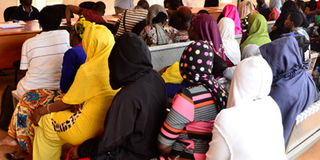Five girls rescued from Saudi Arabia

Rescued. Some of the girls who were intercepted in Kenya enroute to the Middle East are paraded at Ministry of Internal Affairs in Kampala in September last year. PHOTO BY ALEX ESAGALA
What you need to know:
- Uganda has had a number of girls who have either been killed or badly tortured in the Middle East countries.
- Mr Martin Wandera, the director of labour, employment, occupational safety and health in the Gender ministry, said while they try to ensure that the ladies use proper channels for leaving the country, many are trafficked and remain unaccounted for.
The labour liaisons officer at the Ugandan Embassy in Saudi Arabia has rescued five girls who were reportedly locked up incommunicado in Saudi Arabia.
Mr Yasin Abdulaziz Musoke secured the release of the girls after they recorded a distress video and circulated it online.
Every worker who leaves the country officially to work in countries that have labour export agreement with Uganda is given a fully functional phone. Officials from the Gender ministry say this is to facilitate easy communication.
In a video that has been circulating on social media, some of the women are pleading for their release, while others are smiling and shouting the name of Bantu Establishment, the company that took them to Saudi Arabia. Some people believe the lock-up was stage managed to make a case for coming back home.
However, Mr Wilson Usher Owere, the chairman general of the National Organisation of Trade Unions, said the situation in which the girls were in was unbearable.
“This is not acceptable; let our government contact Saudi government to release these poor girls immediately,” he said earlier yesterday.
Ms Esther Nabajju, a director at Bantu Establishment, could not be reached to explain how the girls were locked up in the house. Another company director, who only identified herself as Jackie, said they have already written a report to the Gender ministry and are waiting for the next directive.
Labour firm speaks out
Asked how the girls ended up being locked up, she said: “I am not talking to you about these issues. I know you are media people who always want to write bad things and you refuse to write about good things, so write what you want.”
Mr Martin Wandera, the director of labour, employment, occupational safety and health in the Gender ministry, said they have received the complaints and will investigate the matter.
“This matter has received due attention of our mission in Riyadh [Saudi Arabian capital] and the ladies that appeared in the video are being facilitated to return. One of them returned yesterday, one will return tomorrow and others will also return. But if you watch that video, I see some people laugh at the background, which raises the question of veracity in this video,” Mr Wandera said.
He said while many domestic workers have genuine issues, others make distress calls to come home.
Mr Wandera said many of the girls who are taken out after a short while get overwhelmed by the workload and begin making distress calls, while others are forced to come back by their family members.
He stated that while the workers may have a reason to come back home, they need to have organised exit, because some create unnecessary anxiety.
“There are genuine cases, but there are also cases where people want to use distress to get out of their contracts. They have a right to leave but they should not create unnecessary alarm. They will be facilitated to come back, they don’t need to tell a lie to come back,” he said.




